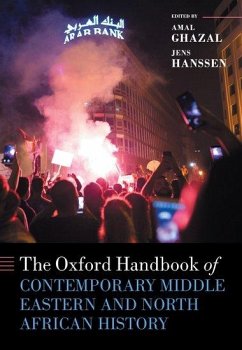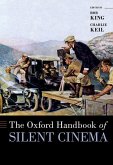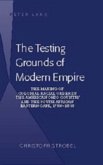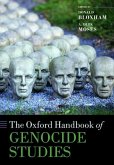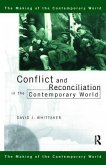The Oxford Handbook of Contemporary Middle-Eastern and North African History
Herausgeber: Hanssen, Jens; Ghazal, Amal N
The Oxford Handbook of Contemporary Middle-Eastern and North African History
Herausgeber: Hanssen, Jens; Ghazal, Amal N
- Gebundenes Buch
- Merkliste
- Auf die Merkliste
- Bewerten Bewerten
- Teilen
- Produkt teilen
- Produkterinnerung
- Produkterinnerung
The OUP Handbook of Contemporary Middle-Eastern and North African History critically examines the defining processes and structures of historical developments in North Africa and the Middle East over the past two centuries.
Andere Kunden interessierten sich auch für
![The Oxford Handbook of the Weimar Republic The Oxford Handbook of the Weimar Republic]() The Oxford Handbook of the Weimar Republic251,99 €
The Oxford Handbook of the Weimar Republic251,99 €![The Oxford Handbook of Silent Cinema The Oxford Handbook of Silent Cinema]() The Oxford Handbook of Silent Cinema234,99 €
The Oxford Handbook of Silent Cinema234,99 €![The Routledge Companion to Britain in the Twentieth Century The Routledge Companion to Britain in the Twentieth Century]() Mark ClapsonThe Routledge Companion to Britain in the Twentieth Century174,99 €
Mark ClapsonThe Routledge Companion to Britain in the Twentieth Century174,99 €![The Testing Grounds of Modern Empire The Testing Grounds of Modern Empire]() Christoph StrobelThe Testing Grounds of Modern Empire95,75 €
Christoph StrobelThe Testing Grounds of Modern Empire95,75 €![The Oxford Handbook of Genocide Studies The Oxford Handbook of Genocide Studies]() The Oxford Handbook of Genocide Studies73,99 €
The Oxford Handbook of Genocide Studies73,99 €![Conflict and Reconciliation in the Contemporary World Conflict and Reconciliation in the Contemporary World]() David J WhittakerConflict and Reconciliation in the Contemporary World196,99 €
David J WhittakerConflict and Reconciliation in the Contemporary World196,99 €![Science, Technology and Society in Contemporary Japan Science, Technology and Society in Contemporary Japan]() Morris LowScience, Technology and Society in Contemporary Japan114,99 €
Morris LowScience, Technology and Society in Contemporary Japan114,99 €-
-
-
The OUP Handbook of Contemporary Middle-Eastern and North African History critically examines the defining processes and structures of historical developments in North Africa and the Middle East over the past two centuries.
Hinweis: Dieser Artikel kann nur an eine deutsche Lieferadresse ausgeliefert werden.
Hinweis: Dieser Artikel kann nur an eine deutsche Lieferadresse ausgeliefert werden.
Produktdetails
- Produktdetails
- Verlag: Hurst & Co.
- Seitenzahl: 768
- Erscheinungstermin: 30. Januar 2021
- Englisch
- Abmessung: 251mm x 172mm x 50mm
- Gewicht: 1560g
- ISBN-13: 9780199672530
- ISBN-10: 0199672539
- Artikelnr.: 59378015
- Herstellerkennzeichnung
- Libri GmbH
- Europaallee 1
- 36244 Bad Hersfeld
- gpsr@libri.de
- Verlag: Hurst & Co.
- Seitenzahl: 768
- Erscheinungstermin: 30. Januar 2021
- Englisch
- Abmessung: 251mm x 172mm x 50mm
- Gewicht: 1560g
- ISBN-13: 9780199672530
- ISBN-10: 0199672539
- Artikelnr.: 59378015
- Herstellerkennzeichnung
- Libri GmbH
- Europaallee 1
- 36244 Bad Hersfeld
- gpsr@libri.de
Jens Hanssen is Associate Professor of Arab Civilization, Middle Eastern Studies and Mediterranean History. He received his D.Phil. in Modern History from Oxford University in 2001 and joined the University of Toronto the following year. He held a SSHRC Insight Grant (2014-2018) on "German-Jewish Echoes in 20th-Arab Thought." His writings have appeared in The New Cambridge History of Islam, Critical Inquiry, Arab Studies Journal, and the International Journal of Middle Eastern Studies. Amal Ghazal received her BA from the American University of Beirut and her MA and PhD from the University of Alberta. She held a Social Sciences and Humanities Research Council post-doctoral fellowship at the University of Toronto. She was a faculty member at Dalhousie University (2006-2017) before she moved to Simon Fraser University where she holds the title of a University Professor and is the Director of the Centre for Comparative Muslim Studies. She specializes in modern Arab intellectual history. Her work has covered the Eastern Mediterranean, North Africa and East Africa. Her first book looked at the politics of identity of the Omani intellectual elite in Zanzibar, situating then in the context of the Arab nahda, Islamic reform, Arabism and anti-colonialism. Her publications have covered a broad spectrum of topics, including Sufism, Islamic reform, conservative thought, Arab nationalism, Ibadism, Word War I, and slavery.
* INTRODUCTION
* I. FOUNDATIONS
* 1: Elizabeth Williams: Environmental History of the Middle East and
North Africa
* 2: Murat Birdal: Fiscal Crisis and Structural Change in the Late
Ottoman Economy
* 3: Dyala Hamzah: Foundations of Religious Reform (Islah) and Cultural
Revival (Nahda)
* 4: Nader Sohrabi: Constitutional Revolutions and State Formations in
Comparison: Iran and Turkey
* II. FORMATIONS
* 5: Eugene Rogan: The First World War and Its Legacyryme in the Middle
East
* 6: Michael Provence: The Levant Mandates
* 7: James McDougall: The Emergence of Nationalism
* 8: Max Weiss: The Matter of Sectarianism
* 9: Chris Houston: Kemalism and Beyond
* 10: Gilbert Achcar: Fascism in the Middle East and North Africa
* III. LEGACIES OF WAR and REVOLUTION
* 11: Jens Hanssen: Communism
* 12: Reem Abou El-Fadl: Nasserism
* 13: Ryme Seferdjeli: A War over the People: The Algerian War of
Independence, 1954 1962
* 14: Avi Raz: Dodging the Peril of Peace: Israel and the Arabs in the
Aftermath of the June 1967 War
* 15: Shahla Talebi: Reliving Tragedies as Historical Reawakenings:
Modern Iran and Its Revolutions
* IV. NEOLIBERAL AUTHORITARIANISMS
* 16: Adam Hanieh: Capital, Labor, and State: Rethinking the Political
Economy of Oil in the Gulf
* 17: Adel Iskandar: Media as Method in the Age of Revolution: Statism
and Digital Contestation
* 18: Laleh Khalili: Counterterrorism and Counterinsurgency in the
Neoliberal Age
* 19: Rosie Bsheer: W(h)ither Arabian Peninsula Studies?
* V. STATE, LAW and GENDER
* 20: Linda Matar: Syria s Economic History: Bumpy Road from Economic
Nationalism to Neoliberalism
* 21: Zahra Ali: The Fragmentation of Gender in Post-Invasion Iraq
* 22: Maya Mikdashi: Sextarianism: Notes on Studying the Lebanese State
* 23: Shourideh C. Molavi: Contemporary Israel/Palestine
* 24: Sherine Hafez: Toward New Approaches to the Anthropology of
Islamic Movements: Women s Islamic Activism and the Question of
Subjectivity
* VI. FROM PROTEST MOVEMENTS TO THE ARAB UPRISINGS
* 25: John Chalcraft: The Arab Uprisings of 2011 in Historical
Perspective
* 26: Omar Al-Shehabi: Political Movements in Bahrain Across the Long
Twentieth Century (1900-2015)
* 27: Reem Saad: Before the Spring: Shifting Patterns of Protest in
Rural Egypt
* 28: Larbi Sadiki: Cascading Liberation and Renewal Tunisia in History
* 29: Linda Herrera and Abdel-Rahman Mansour: Arab Youth: Disruptive
Generation of the Twenty-first Century?
* 30: Atiaf Alwazir: The Yemeni Uprising of 2011: A Product of 20 Years
of Grassroot Activism
* VII. CRISIS and COLLAPSE
* 31: Asli Bali: The New Turkey at Home and Abroad
* 32: Abbas Vali: The Crisis of Sovereignty, Ruptured Domination and
the Kurdish Quest for Democratic Self-Government in Syria
* 33: Frederic Wehrey: After Qadhafi: Libya s Path to Collapse
* EPILOGUE
* I. FOUNDATIONS
* 1: Elizabeth Williams: Environmental History of the Middle East and
North Africa
* 2: Murat Birdal: Fiscal Crisis and Structural Change in the Late
Ottoman Economy
* 3: Dyala Hamzah: Foundations of Religious Reform (Islah) and Cultural
Revival (Nahda)
* 4: Nader Sohrabi: Constitutional Revolutions and State Formations in
Comparison: Iran and Turkey
* II. FORMATIONS
* 5: Eugene Rogan: The First World War and Its Legacyryme in the Middle
East
* 6: Michael Provence: The Levant Mandates
* 7: James McDougall: The Emergence of Nationalism
* 8: Max Weiss: The Matter of Sectarianism
* 9: Chris Houston: Kemalism and Beyond
* 10: Gilbert Achcar: Fascism in the Middle East and North Africa
* III. LEGACIES OF WAR and REVOLUTION
* 11: Jens Hanssen: Communism
* 12: Reem Abou El-Fadl: Nasserism
* 13: Ryme Seferdjeli: A War over the People: The Algerian War of
Independence, 1954 1962
* 14: Avi Raz: Dodging the Peril of Peace: Israel and the Arabs in the
Aftermath of the June 1967 War
* 15: Shahla Talebi: Reliving Tragedies as Historical Reawakenings:
Modern Iran and Its Revolutions
* IV. NEOLIBERAL AUTHORITARIANISMS
* 16: Adam Hanieh: Capital, Labor, and State: Rethinking the Political
Economy of Oil in the Gulf
* 17: Adel Iskandar: Media as Method in the Age of Revolution: Statism
and Digital Contestation
* 18: Laleh Khalili: Counterterrorism and Counterinsurgency in the
Neoliberal Age
* 19: Rosie Bsheer: W(h)ither Arabian Peninsula Studies?
* V. STATE, LAW and GENDER
* 20: Linda Matar: Syria s Economic History: Bumpy Road from Economic
Nationalism to Neoliberalism
* 21: Zahra Ali: The Fragmentation of Gender in Post-Invasion Iraq
* 22: Maya Mikdashi: Sextarianism: Notes on Studying the Lebanese State
* 23: Shourideh C. Molavi: Contemporary Israel/Palestine
* 24: Sherine Hafez: Toward New Approaches to the Anthropology of
Islamic Movements: Women s Islamic Activism and the Question of
Subjectivity
* VI. FROM PROTEST MOVEMENTS TO THE ARAB UPRISINGS
* 25: John Chalcraft: The Arab Uprisings of 2011 in Historical
Perspective
* 26: Omar Al-Shehabi: Political Movements in Bahrain Across the Long
Twentieth Century (1900-2015)
* 27: Reem Saad: Before the Spring: Shifting Patterns of Protest in
Rural Egypt
* 28: Larbi Sadiki: Cascading Liberation and Renewal Tunisia in History
* 29: Linda Herrera and Abdel-Rahman Mansour: Arab Youth: Disruptive
Generation of the Twenty-first Century?
* 30: Atiaf Alwazir: The Yemeni Uprising of 2011: A Product of 20 Years
of Grassroot Activism
* VII. CRISIS and COLLAPSE
* 31: Asli Bali: The New Turkey at Home and Abroad
* 32: Abbas Vali: The Crisis of Sovereignty, Ruptured Domination and
the Kurdish Quest for Democratic Self-Government in Syria
* 33: Frederic Wehrey: After Qadhafi: Libya s Path to Collapse
* EPILOGUE
* INTRODUCTION
* I. FOUNDATIONS
* 1: Elizabeth Williams: Environmental History of the Middle East and
North Africa
* 2: Murat Birdal: Fiscal Crisis and Structural Change in the Late
Ottoman Economy
* 3: Dyala Hamzah: Foundations of Religious Reform (Islah) and Cultural
Revival (Nahda)
* 4: Nader Sohrabi: Constitutional Revolutions and State Formations in
Comparison: Iran and Turkey
* II. FORMATIONS
* 5: Eugene Rogan: The First World War and Its Legacyryme in the Middle
East
* 6: Michael Provence: The Levant Mandates
* 7: James McDougall: The Emergence of Nationalism
* 8: Max Weiss: The Matter of Sectarianism
* 9: Chris Houston: Kemalism and Beyond
* 10: Gilbert Achcar: Fascism in the Middle East and North Africa
* III. LEGACIES OF WAR and REVOLUTION
* 11: Jens Hanssen: Communism
* 12: Reem Abou El-Fadl: Nasserism
* 13: Ryme Seferdjeli: A War over the People: The Algerian War of
Independence, 1954 1962
* 14: Avi Raz: Dodging the Peril of Peace: Israel and the Arabs in the
Aftermath of the June 1967 War
* 15: Shahla Talebi: Reliving Tragedies as Historical Reawakenings:
Modern Iran and Its Revolutions
* IV. NEOLIBERAL AUTHORITARIANISMS
* 16: Adam Hanieh: Capital, Labor, and State: Rethinking the Political
Economy of Oil in the Gulf
* 17: Adel Iskandar: Media as Method in the Age of Revolution: Statism
and Digital Contestation
* 18: Laleh Khalili: Counterterrorism and Counterinsurgency in the
Neoliberal Age
* 19: Rosie Bsheer: W(h)ither Arabian Peninsula Studies?
* V. STATE, LAW and GENDER
* 20: Linda Matar: Syria s Economic History: Bumpy Road from Economic
Nationalism to Neoliberalism
* 21: Zahra Ali: The Fragmentation of Gender in Post-Invasion Iraq
* 22: Maya Mikdashi: Sextarianism: Notes on Studying the Lebanese State
* 23: Shourideh C. Molavi: Contemporary Israel/Palestine
* 24: Sherine Hafez: Toward New Approaches to the Anthropology of
Islamic Movements: Women s Islamic Activism and the Question of
Subjectivity
* VI. FROM PROTEST MOVEMENTS TO THE ARAB UPRISINGS
* 25: John Chalcraft: The Arab Uprisings of 2011 in Historical
Perspective
* 26: Omar Al-Shehabi: Political Movements in Bahrain Across the Long
Twentieth Century (1900-2015)
* 27: Reem Saad: Before the Spring: Shifting Patterns of Protest in
Rural Egypt
* 28: Larbi Sadiki: Cascading Liberation and Renewal Tunisia in History
* 29: Linda Herrera and Abdel-Rahman Mansour: Arab Youth: Disruptive
Generation of the Twenty-first Century?
* 30: Atiaf Alwazir: The Yemeni Uprising of 2011: A Product of 20 Years
of Grassroot Activism
* VII. CRISIS and COLLAPSE
* 31: Asli Bali: The New Turkey at Home and Abroad
* 32: Abbas Vali: The Crisis of Sovereignty, Ruptured Domination and
the Kurdish Quest for Democratic Self-Government in Syria
* 33: Frederic Wehrey: After Qadhafi: Libya s Path to Collapse
* EPILOGUE
* I. FOUNDATIONS
* 1: Elizabeth Williams: Environmental History of the Middle East and
North Africa
* 2: Murat Birdal: Fiscal Crisis and Structural Change in the Late
Ottoman Economy
* 3: Dyala Hamzah: Foundations of Religious Reform (Islah) and Cultural
Revival (Nahda)
* 4: Nader Sohrabi: Constitutional Revolutions and State Formations in
Comparison: Iran and Turkey
* II. FORMATIONS
* 5: Eugene Rogan: The First World War and Its Legacyryme in the Middle
East
* 6: Michael Provence: The Levant Mandates
* 7: James McDougall: The Emergence of Nationalism
* 8: Max Weiss: The Matter of Sectarianism
* 9: Chris Houston: Kemalism and Beyond
* 10: Gilbert Achcar: Fascism in the Middle East and North Africa
* III. LEGACIES OF WAR and REVOLUTION
* 11: Jens Hanssen: Communism
* 12: Reem Abou El-Fadl: Nasserism
* 13: Ryme Seferdjeli: A War over the People: The Algerian War of
Independence, 1954 1962
* 14: Avi Raz: Dodging the Peril of Peace: Israel and the Arabs in the
Aftermath of the June 1967 War
* 15: Shahla Talebi: Reliving Tragedies as Historical Reawakenings:
Modern Iran and Its Revolutions
* IV. NEOLIBERAL AUTHORITARIANISMS
* 16: Adam Hanieh: Capital, Labor, and State: Rethinking the Political
Economy of Oil in the Gulf
* 17: Adel Iskandar: Media as Method in the Age of Revolution: Statism
and Digital Contestation
* 18: Laleh Khalili: Counterterrorism and Counterinsurgency in the
Neoliberal Age
* 19: Rosie Bsheer: W(h)ither Arabian Peninsula Studies?
* V. STATE, LAW and GENDER
* 20: Linda Matar: Syria s Economic History: Bumpy Road from Economic
Nationalism to Neoliberalism
* 21: Zahra Ali: The Fragmentation of Gender in Post-Invasion Iraq
* 22: Maya Mikdashi: Sextarianism: Notes on Studying the Lebanese State
* 23: Shourideh C. Molavi: Contemporary Israel/Palestine
* 24: Sherine Hafez: Toward New Approaches to the Anthropology of
Islamic Movements: Women s Islamic Activism and the Question of
Subjectivity
* VI. FROM PROTEST MOVEMENTS TO THE ARAB UPRISINGS
* 25: John Chalcraft: The Arab Uprisings of 2011 in Historical
Perspective
* 26: Omar Al-Shehabi: Political Movements in Bahrain Across the Long
Twentieth Century (1900-2015)
* 27: Reem Saad: Before the Spring: Shifting Patterns of Protest in
Rural Egypt
* 28: Larbi Sadiki: Cascading Liberation and Renewal Tunisia in History
* 29: Linda Herrera and Abdel-Rahman Mansour: Arab Youth: Disruptive
Generation of the Twenty-first Century?
* 30: Atiaf Alwazir: The Yemeni Uprising of 2011: A Product of 20 Years
of Grassroot Activism
* VII. CRISIS and COLLAPSE
* 31: Asli Bali: The New Turkey at Home and Abroad
* 32: Abbas Vali: The Crisis of Sovereignty, Ruptured Domination and
the Kurdish Quest for Democratic Self-Government in Syria
* 33: Frederic Wehrey: After Qadhafi: Libya s Path to Collapse
* EPILOGUE

